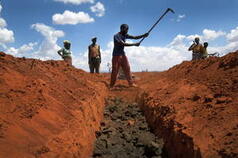Watch this interview with Agnes Mwang'ombe of the University of Nairobi, who represents the Higher Education Constituency at the local level in the GFAR Steering Committee. During the recent meeting of the Steering Committee on 8-9 February 2017, Agnes pointed out that business as usual is not going to adequately equip students in agricultural and life sciences for the 21st Century. In this interview, she shares with us how she plans to help Partners in her constituency engage in collective actions with an aim to reform curricula to meet today's challenges.
Mankind's future ability to feed itself is in jeopardy due to intensifying pressures on natural resources, mounting inequality, and the fallout from a changing climate, warns a new FAO report out today.
Though very real and significant progress in reducing global hunger has been achieved over the past 30 years, "expanding food production and economic growth have often come at a heavy cost to the natural environment," says The Future of Food and Agriculture: Trends and Challenges.
From microdrip irrigation systems to drought-resistant hybrid seeds, there are hundreds of social enterprises providing innovations that help farmers increase the yield and quality of their crops. While these social enterprises offer huge promise, they face challenges that make their growth extremely challenging.
During a dynamic two-day meeting on 8-9 February, members of the renewed GFAR Steering Committee (SC) met together at the GFAR host organization, FAO in Rome, to set the agenda for this unique global forum on agri-food research and innovation, towards helping to meet the UN’s 2030 Sustainable Development Goals (SDGs). GFAR has undergone a major transformation and now brings together a vibrant and fast-growing community of self-declared Partners in GFAR (presently 433 Partner organizations), who recognize that these complex challenges can only be met through working together for success.


